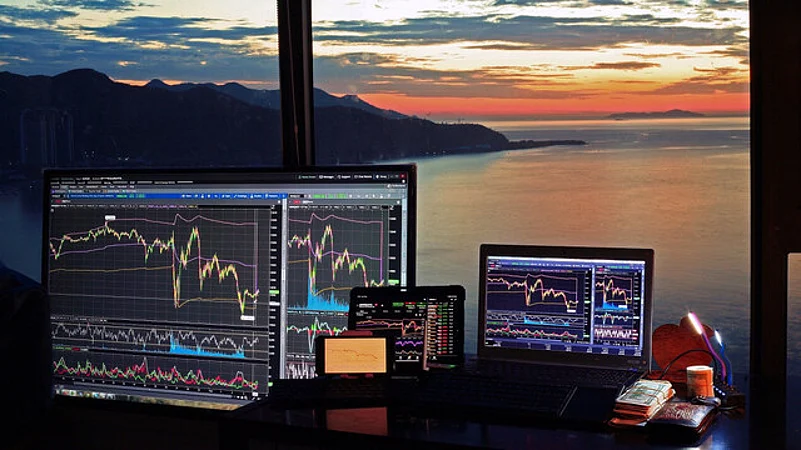On February 24, 2022, the global markets crashed amid reports of Russia starting a war with Ukraine. Early afternoon, Russian President Vladimir Putin announced a ‘special military action’ in eastern Ukraine. The sudden development surprised market participants and panic selling ensued. In India, too, the broader Nifty 50 fell by 4.8 per cent to settle at 16,248 while the Sensex fell by 4.7 per cent to trade at 54,530. India’s volatility index VIX increased by 30.31 per cent to close at 31.98.
It was a black Thursday for Indian investors and market traders, but experts believe that markets are likely to remain volatile for some time. Should you also sell in a hurry to cut losses? Or, is there a better way to manage the situation, especially when the next few days are unpredictable? Here are five do’s and don’ts of investing in a volatile equity market.

Don't Panic
Volatility is the inherent nature of stock markets. Historically, too, markets have fallen in reaction to such situations—be it wars, pandemics, terrorist attacks, financial crisis, scams, or others--and then recovered. “Equity investing is generally considered for long-term investments. The one thing that remained constant despite these volatile events was the growth in equity markets. So, even if some investors had invested at the peak, say, before the global financial crisis or before the Covid pandemic, their wealth would have compounded over time,” says Vijay Kuppa, co-founder, Orowealth, a wealth and investment management fintech startup. Instead of timing the market, time your investments by doing regular investments through SIPs and use these corrections to deploy idle cash.
Don’t Exit From Equity
The market moves at its own rhythm and you, as an investor, move according to the rhythm of your financial planning, regardless of the market movement. Volatility, as seen in these few days, should not make you think about exiting from the equity asset class. Your investments are for the long term; conflict is temporary. Staying in the market will ensure that you can take advantage of the rally that usually follows. For instance, when the Covid pandemic hit India and markets started falling, many investors withdrew from equity. When the market rally began, markets rewarded those who had remained invested.
Do Small Systematic Investments Rather Than Going All In
As the markets crashed yesterday due to the news of outbreak of war, you might have thought of buying during the dip. If you do that, you are assuming that the market will not fall any further. Nobody can predict this. So, to make sure that you effectively bring down your average rupee cost of investments, buy in a small systematic way rather than going all in within one day. Use this fall as an opportunity to buy systematically.
“Market falls like this offer excellent opportunities for investors. Use a staggered approach to invest idle cash as markets are likely to remain volatile for the next 6-8 weeks. A good investment strategy could be to park idle funds in arbitrage funds or liquid funds and use STP (systematic transfer plan) to transfer to index funds or other equity funds based on your risk appetite,” says Piyush Nagda, head- investment products at Prabhudas Lilladher, a financial services company.

Maintain Strict Asset Allocation Goals
If you are investing according to your financial goals (which, you ideally should be), then do not deviate from that unless you have reached your goal. A lot of factors are taken into account when an asset allocation plan is made. So, short-term changes in the market should not affect you.
“Macroeconomic repercussions such as the geopolitical tension between Russia and Ukraine can result in a strong price drop in the equity markets. These kinds of events are short lived but can lead to market volatility. These ‘special events’ are a great time to invest. Investors should focus on asset allocation and build long-term positions using the market volatility. They should continue with SIPs in India-focused funds as SIPs have the benefit of rupee cost averaging, which works the best in times of market volatility,” says Shaily Shah, co-founder, Tarrakki, a wealth management platform. While the conflict is a short-term event, an equity investor is generally someone who has invested for the long run, a minimum of 3-5 years. Moreover, India’s long-term macroeconomic conditions stay strong. In fact, Moody’s has raised India’s 2022 GDP forecast grow from 7 per cent to 9.5 per cent. So, the markets will reward patient investors. “Markets are generally a derivative of the fundamental story. So, if the fundamentals are intact, timing the market will not add any additional value over a long-term investing journey,” says Kuppa.
Do A Portfolio Review
While broad indices were down, individual stocks and sector specific exchange-traded funds (ETFs) might have followed other trajectories. Analyze your investment portfolio’s health and then check to see if you need to exit a specific stock, mutual fund or ETF or do you need to top up your investments. Fundamentally, nothing has changed for most of the listed companies.
"The equity market might be down due to the war crisis. But other asset classes in the commodity segment like gold etc. have seen their values rise. So analyse your investment portfolio and check to see if your allocation to other asset classes needs any further investment or shifting," says Deepesh Raghaw, founder, PersonalFinancePlan, a Sebi-Registered Investment Advisor.













